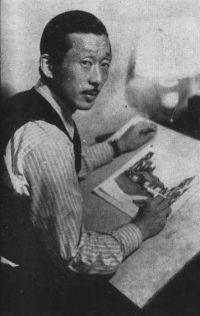Bob Kuwahara: Difference between revisions
mNo edit summary |
mNo edit summary |
||
| (One intermediate revision by the same user not shown) | |||
| Line 14: | Line 14: | ||
[[Category:🇯🇵🇺🇸]] | [[Category:🇯🇵🇺🇸]] | ||
[[Category: Television]] | [[Category:Television]] | ||
[[Category: Nikkei]] | [[Category:Nikkei]] | ||
[[Category: Nikkei who were interned]] | [[Category:Animators]] | ||
[[Category: August 12 Births]] | [[Category:Nikkei who were interned]] | ||
[[Category: 1901 Births]] | [[Category:August 12 Births]] | ||
[[Category: 1964 Deaths]] | [[Category:1901 Births]] | ||
[[Category:1964 Deaths]] | |||
Latest revision as of 00:33, 20 April 2024

Rokuro "Bob" Kuwahara, a creative whirlwind and pioneer in the animation scene, was born on the bustling streets of Tokyo in 1901 before setting sail for the U.S. in 1910. A proud graduate of Los Angeles Polytechnic High School in '21 and an Otis Art Institute alum, Kuwahara was on the fast track to greatness, but the Wall Street Crash of '29 sent him scrambling back to LA from NYC.
Fast forward to 1932, and Bob's slinging his artistic magic at Walt Disney, putting his stamp on classics like Thru the Mirror and the Oscar-nominated Who Killed Cock Robin?, and even the legendary Snow White and the Seven Dwarfs. But his journey took a hard pivot when WWII saw him and his family interned at Heart Mountain, a stark reminder of a darker chapter in American history.
Post-war life saw Kuwahara in New York's Larchmont, where he created the comic strip Miki before diving back into animation with Terrytoons, churning out gems and helming the beloved Hashimoto-san series. Even after the spotlight dimmed on Hashimoto-san, Bob kept the animation magic alive with The Astronut Show until his passing in 1964.
In 1945 Kuwahara and his family moved to Larchmont, New York where he wrote and drew a comic strip called Miki for five years before low circulation forced him to drop the strip. In 1950 Kuwahara returned to animation, signing on with Paul Terry's Terrytoons studio, and stayed with the studio following CBS' purchase of the studio in 1955. In 1959 Kuwahara wrote and directed the first of 14 Hashimoto-san theatrical shorts, for which he is probably best remembered today. Production of these shorts continued until 1963, after which time they were incorporated into CBS' The Hector Heathcote Show. During the same period Kuwahara was also a director for the popular Deputy Dawg series. Kuwahara's final TV series was 1965's syndicated The Astronut Show. Kuwahara died in 1964.